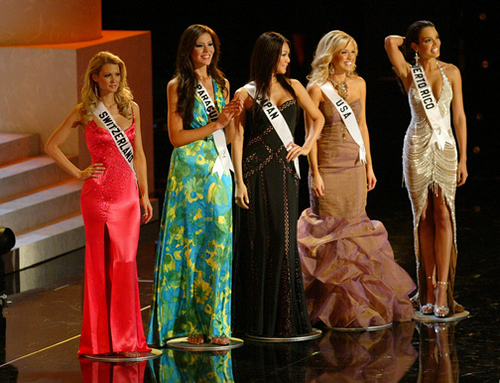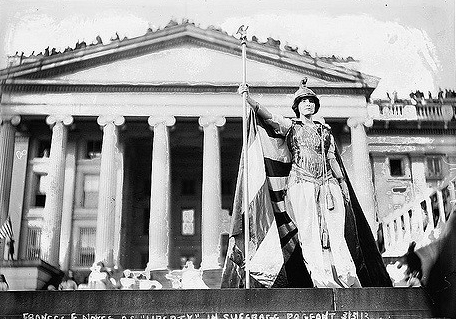 2016
2016
Finalists at the 2006 Miss Universe Pageant.
As owner of the Miss Universe pageant, Republican presidential candidate Donald Trump took a hands-on approach, monitoring the competitors and winners closely. At the first presidential debate, the unsavory side of his involvement was the subject of an attack from Democratic nominee Hillary Clinton. Jeremy Stahl wrote in Slate:
Who is Alicia Machado? She is a woman from Venezuela, who in 1996 won the then Trump-owned Miss Universe pageant and now says Trump disparaged her for her appearance and for her ethnicity. “He called me Miss Piggy,” she told Inside Edition in May. “I was very depressed.”
“After that episode, I was sick, anorexia and bulimia for five years,” Machado added. “Over the past 20 years, I’ve gone to a lot of psychologists to combat this.”
As the Huffington Post noted in its write-up at the time, Trump had described her as an “eating machine” in an interview with Howard Stern and admitted to the New York Times that he had pushed her to lose weight. The “Miss Housekeeping” remark that Machado claims he made was apparently a reference to her Latina heritage. In August, Machado became a U.S. citizen and promised that she’d be voting in this election, as Clinton noted.
 1914
1914
Hedwig Reicher as Columbia in a suffrage parade, 1913. Library of Congress.
Beauty pageants have been connected to voting and civic duty since their inception, and suffragettes used the spectacle of pageantry to promote their cause as early as 1913. Hazel Mackaye, a theater director and the daughter of playwright Steele Mackaye, produced many of these pageants for the National American Woman Sufferage Association. In 1914 she wrote in the newspaper The Suffragist:
Perhaps the most striking instance of what a pageant can do to make covers is afforded by the Metropolitan Pageant written by Margaret Tuttle, which was given at the Metropolitan Opera House in May 1913. I cannot personally speak of what it did on that occasion, but I know what it did when it was repeated in Cleveland in May, 1914. At that performance, people were asked to sign the petitions before the performance began, but many refused to do so. After they had witnessed the spectacle, however, and breathed in the beauty, the sincerity, the majesty of what had taken place upon the stage, and had been filled to the brim with its spiritual message, those same people, upon the list. As one man said, “No one could witness that noble spectacle and have a doubt left in his mind that human beings capable of so lofty and beautiful a think were unworthy of the vote,” and that, for his part, he felt that any man, after witnessing this pageant, should still deny women the right to vote should be summarily disposed of then and there. For the purpose of propaganda, a pageant can hardly be surpassed.